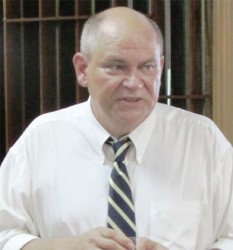By Jeff Trotman
Local government is the most important level of government simply because it directly affects the lives of people within the community in which they live. Consequently, it is important that people make decisions that affect their daily lives.
Glenn Bradbury expressed the view at a town hall meeting on local government held at the Watooka House, Linden, on October 30th. The town hall meeting which attracted about eighty people, including Linden IMC Chairman, Orrin Gordon, was organized by IRI/USAID.
Bradbury, the Regional Country Director of the International Republican Institute (IRI)/USAID LEAD Programme in Guyana, stressed that when one votes at the local government level one is basically looking after the interest of one’s family, community and one’s self. In an hour and a half discourse, Bradbury noted that Guyana has not had local government elections for quite some time and a lot of people, who would be eligible to vote at the next local government elections would be unaccustomed to the process. According to him, this situation would be compounded by the fact that the next local government elections will be a hybrid of first past the post and proportional representation.

Explaining that the election will comprise two components under one umbrella, Bradbury said that under first past the post, groups, political parties as well as independent candidates can contest for seats in the respective constituencies within a local government area and the candidate that wins the most votes in a respective constituency will be declared the winner for that constituency.
Additionally, an equal number of positions would also be contested at the local government level by groups or political parties and the positions will be allocated by proportional representation, or the number of votes each group or political party receives. “For example, if forty percent of the electorate votes for a specific party or a group then forty per cent of the seats will be allocated to that party or group.”
During his discourse, the IRI Regional Country Director outlined general differences in the structure and responsibilities that exist between Central Government and local government. He also pointed out that Guyana has six municipalities (towns) and 65 Neighbourhood Democratic Councils (NDCs). He noted that Region Ten has one municipality, i.e., Linden and one NDC in Kwakwani.
Stressing that every person, who is eligible to vote should exercise that right to vote, Bradbury highlighted that persons, who are eligible to vote, have the right to be off their job for a reasonable amount of time, including the lunch period to be able to cast their vote. He said persons in Australia, who are eligible to vote and refuse to vote, are fined A$25.
Highlighting that eligible persons have the right to register to vote, Bradbury stressed that prospective voters must ensure that they register in the area or constituency in which they live in order to be able to vote in that area. The IRI officer also touched on the right to have a peaceful and secret ballot as well as the right to attend political meetings and campaigns.
He also said it is the voters’ responsibility to object to inaccurate information on the Voters’ List as well as to request corrections during the Claims and Objections period. Bradbury also stressed the importance of the electorate seeking information on the various groups, political parties and candidates, who will be seeking to be elected. He also called on voters to acquaint themselves with the boundaries of the NDCs and municipalities in which they are eligible to vote. He said voters must follow instructions at the polling station and give other voters equal opportunity to vote.









